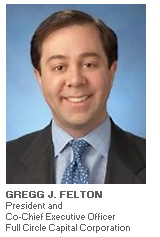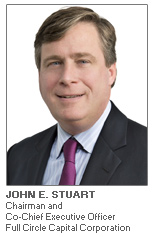
In May, Full Circle Capital Corporation announced the appointment of Michael Gervais and Jonathan Burklund as Managing Directors to lead its newly launched Healthcare Strategies team, focused on providing flexible debt financing to middle-market and lower middle-market healthcare companies. Full Circle Capital Corporation is a Greenwich, Connecticut based closed-end investment company that has elected to be treated as a Business Development Company (BDC), and it is this election to operate as BDC that provides Full Circle the unique opportunity to deliver a variety of financing solutions to the healthcare sector.
Both Gervais and Burklund possess deep roots in the healthcare sector. Gervais – whose responsibilities include the development of healthcare investment strategies, origination and portfolio management – brings with him over 25 years of experience in healthcare finance and was the founder and CEO of Gemino Healthcare Finance until the company’s sale in 2013. Burklund, who joined Full Circle as the Co-Head of Healthcare Strategies also possesses over 25 years of experience in healthcare corporate finance and will be responsible for originating healthcare finance opportunities as well as strategic advisory. Prior to joining Full Circle Capital, Burklund was founding partner of River Corporate Advisors, a mergers and acquisitions advisory firm specializing in healthcare services as well as Managing Director of Weild & Co., an investment bank.
While BDCs have been in the market for many years, this corporate structure is unique to healthcare lending. ABL Advisor spent time with Gregg Felton, President and Co-CEO and John Stuart, Co-CEO of Full Circle Capital as well as Mike Gervais and Jonathan Burklund to learn more about this new healthcare lending specialist’s mission and the strategy behind operating as a BDC.
Over the past few years, the commercial finance industry has witnessed a number of alternative lenders enter the lending landscape, and healthcare is certainly a sector of interest for many. However, BDCs are unique in their structure and according to Gregg Felton, provide a certain level of flexibility and unique funding capabilities – factors that position Full Circle to succeed in an increasingly competitive lending environment.
“We believe BDCs are a particularly attractive architecture,” says Felton. “When providing capital to the market in the form of alternative credit, one of most important requirements is access to a long-term capital base. This is a key differentiator for us because, as a BDC, we have established a permanent capital vehicle which is a closed-end fund by format, operating as a Regulated Investment Company (RIC) – therefore substantially all of our income is distributed to our shareholders. As a result, our investors gain the benefit of liquidity, and we enjoy the benefit of long-term capital or capital duration. We don’t believe a lender can compete effectively in this market without capital duration. We find this platform very appealing in terms of pursuing a variety of different verticals within the BDC platform.”
John Stuart agrees stating, “BDCs are becoming more mainstream capital providers because of their flexibility and permanent capital base. This structure positions Full Circle with the lending flexibility required to succeed in the healthcare sector.”

BDCs are regulated by the Investment Company Act of 1940, and are subject to disclosure requirements; however, BDCs are not subjected to the same level of regulatory requirements as banks – which have been limited to some degree in their lending flexibility particularly post financial crisis. On this point Felton adds, “When a borrower requires a lender to leap ‘out of the box’ on a transaction, they often find banks are limited in their financing capabilities. Additionally, the time required for a bank lender to extend a commitment is typically long. As a BDC, we can be much more flexible in relation to lending terms and timing than the traditional bank lending community can provide.”
Mike Gervais agrees, “As Gregg mentioned, as a BDC we have much more flexibility than traditional finance companies, which gives us a big competitive edge. Many finance companies are funded via equity as well as bank lines, so they are somewhat governed indirectly by what the banks can or cannot provide in terms of financing. Therefore, operating as a BDC provides us a tremendous advantage over many of the finance companies in the marketplace.”
Building the Best Healthcare Team
According to the recently released SourceMedia Mid-Market Pulse (MMP), M&A practitioners predict significant expansion in healthcare deals with healthcare named as the strongest sector of those measured by the MMP, beating industry scores for manufacturing, TMT (technology, media and telecommunications), financial services and energy.
Continued on Page 2...